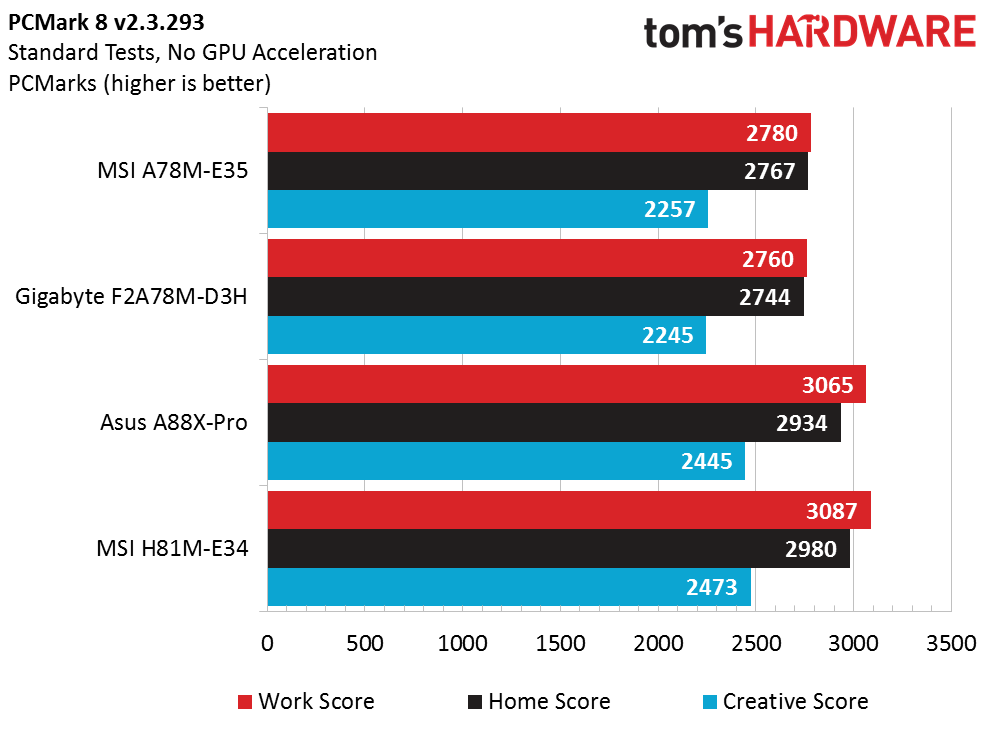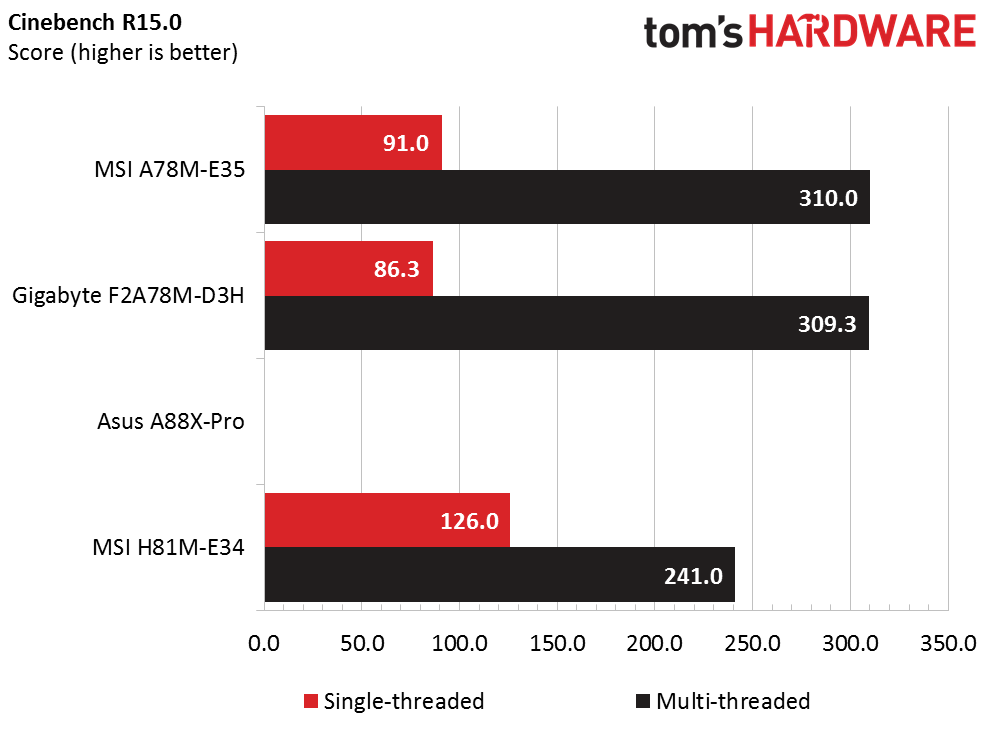MSI A78M-E35 Versus Gigabyte GA-F2A78M-D3H
Today we look at two AMD A78-based motherboards (MSI's A78M-E35 and Gigabyte's GA-F2A78M-D3H), to determine how they stack up against A88X.
Why you can trust Tom's Hardware
Benchmark Results
Since I have three comparisons going on within these charts, I will do my best to describe what the numbers mean and how those results reflect the different scenarios. Though the primary focus is comparing the A78-based boards, I also want to explore which platform might be best for a particular budget and system configuration. Let’s jump in!
Both A78 boards demonstrate similar behavior, which is expected. With less than 1.0 percent variance between them in all three usage scenarios, it's safe to say that the components are configured properly. This also shows us that when I compare A78 to A88X or H81M, I do see a slight performance decrease, which could be attributed to memory performance and possibly APU limitations.
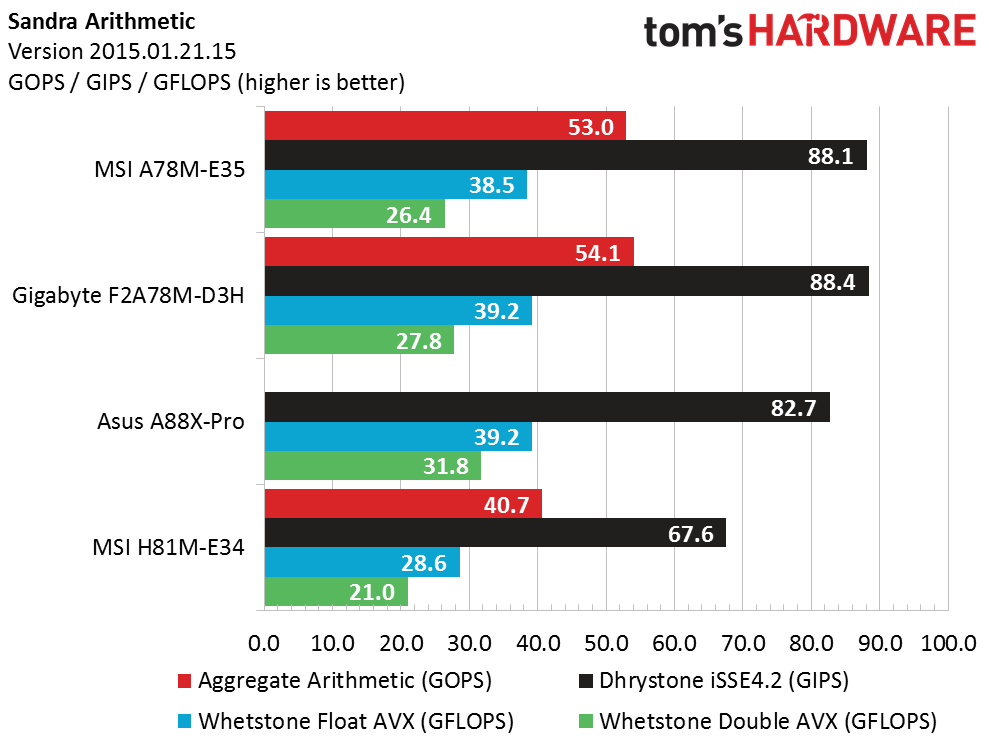
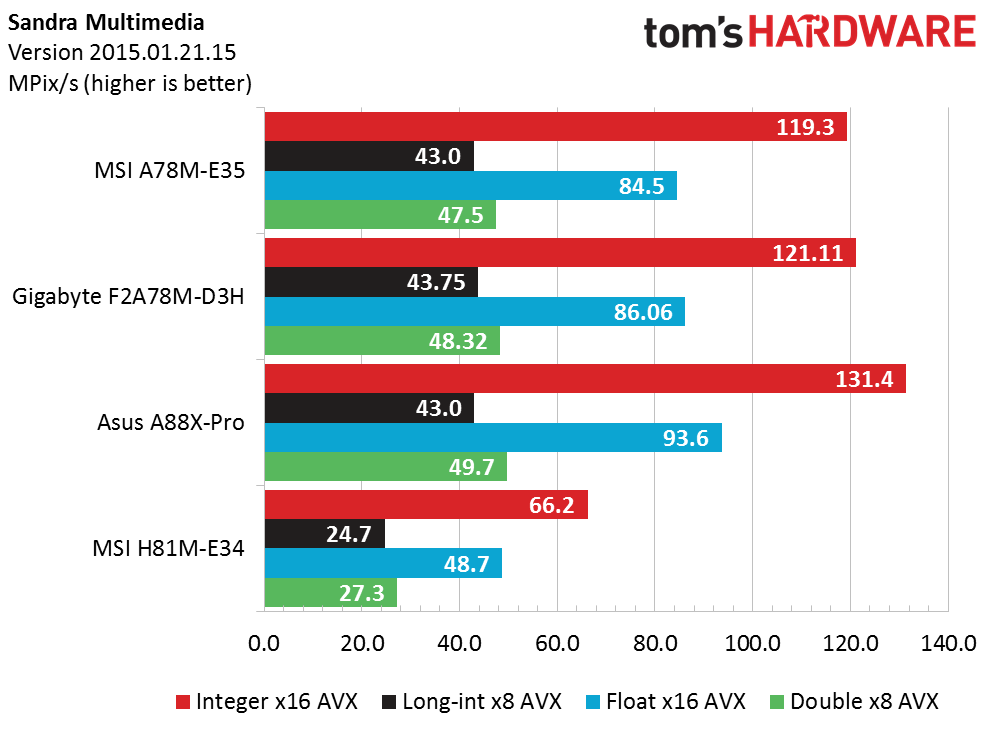
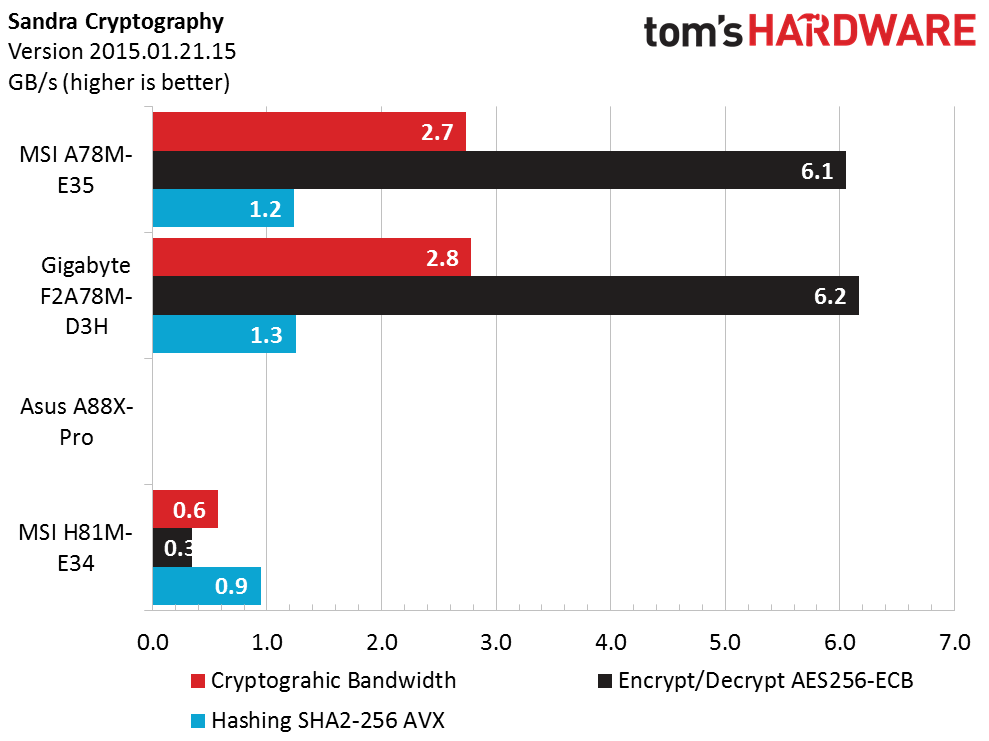
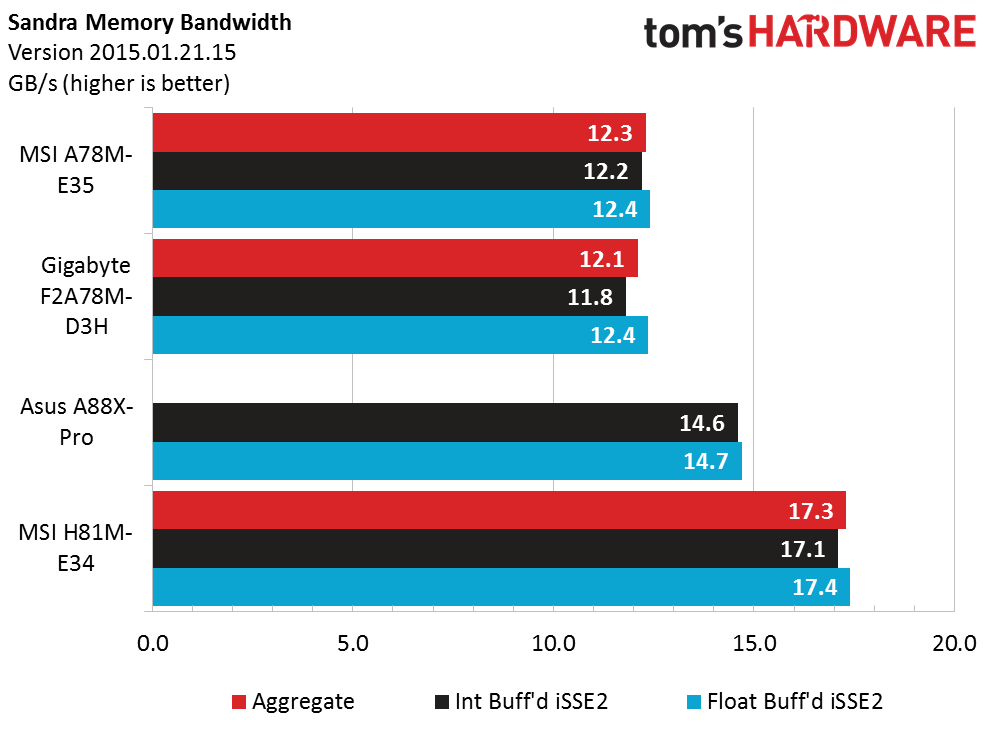
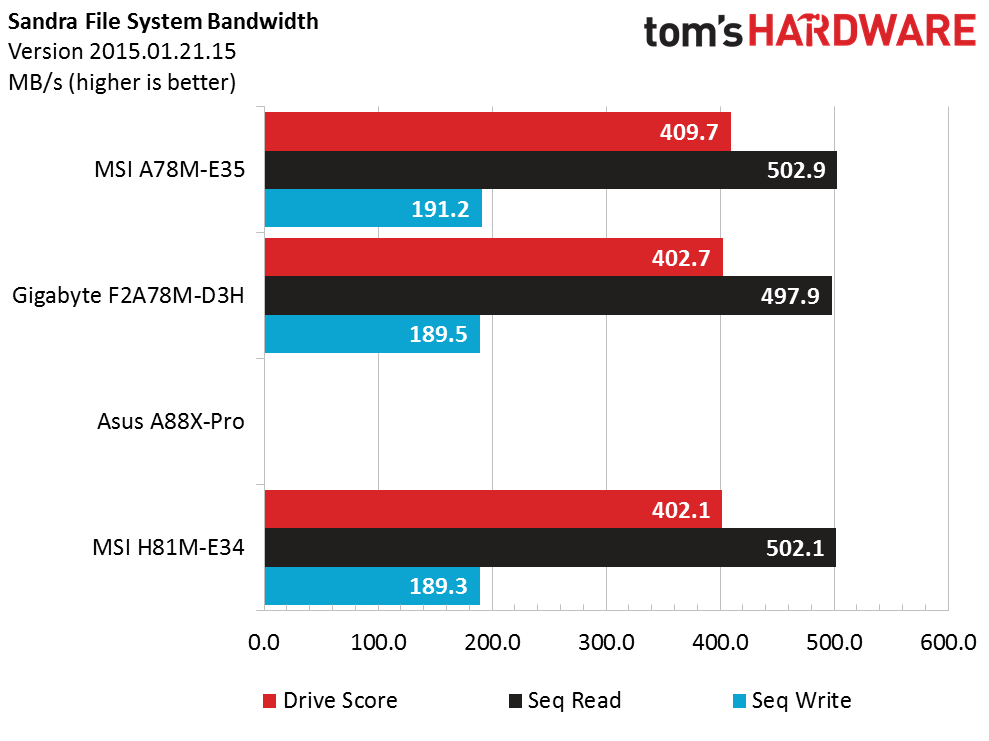
Again, I observe consistent results with the A78 boards, with the Whetstone Double AVX showing the largest deviation of 2.6 percent across all SiSoftware tests. It is interesting (though not entirely surprising) to see that the Intel platform has higher memory performance than A78 while using the same memory modules. Also, the AMD APU scores better than the dual-core Pentium G3258, though I did not quite get twice the performance.
Both A78 boards perform well when I compare them to the multi-threaded results from Intel. However, single-threaded performance is clearly better on the Pentium. It's also important to note that Intel’s multi-thread to single-thread ratio is 1.91 (close to two since it’s a dual-core processor), whereas AMD's ratio is 3.58, quite a way off from the ratio of four for a quad-core processor. This shows how important CPU architecture is.
Get Tom's Hardware's best news and in-depth reviews, straight to your inbox.
-
-Fran- The only problem I have with these boards, is the lack of a proper sound chip in them. The Realtek 887 sucks. It had been a 889 or a 1150 or even a VIA VT17xx, VT18xx or a VT 20xx.Reply
Plus, the VRMs have to be of good quality as well for noise over the sound card. Remember you're recommending these boards for HTPC as well, so noise over audio is a HUGE issue when not careful.
Cheers! -
SuperVeloce "It's also important to note that Intel’s multi-thread to single-thread ratio is 1.91 (close to two since it’s a dual-core processor), whereas AMD's ratio is 3.58, quite a way off from the ratio of four for a quad-core processor. This shows how important CPU architecture is."Reply
Well, A10 apu has turbo, Pentium does not, so there is that -
Shankovich Nifty little review. Have a friend who wants to game on PC more than console but doesn't want to spend much, was looking into AMD's APU's.Reply
Also, I love Gigabyte and they're usually my first choice for boards, but this review highlights my biggest pet peeve with them: fan header placement. Seriously Gigabyte, stop putting the damn things in line with PCI-E slots or in the most hard to reach places. -
Someone Somewhere One minor change: The specs chart up the top shows both boards as not having a digital audio out, but it's fairly obvious from the images that the Gigabyte does.Reply -
TheTerk ReplyOne minor change: The specs chart up the top shows both boards as not having a digital audio out, but it's fairly obvious from the images that the Gigabyte does.
the sample I reviewed is PCB revision 4.0 which does not have an optical out on the rear panel. Looking at Gigabyte's A78 page, revision 3.0 has the optical connector on the rear panel. Looks like there's a header location on the rev 4 board for S/PDIF connector. We will update the article accordingly.
-
logainofhades Reply16053568 said:I think you could have gone with faster ram for the igpu and ditched the GT 730
The GT 730 would still be faster, as it was the 64bit, GDDR5, version. If memory serves me right, the 7850k's IGP was about even with an R7 240. The GT 730 is 3 tiers above that, according to the GPU Hierarchy Chart.
-
RedJaron Reply
We also aren't going for maximum performance or performance/money here. Keeping the test benches similar ( hopefully identical except for the reviewed part, ) means the results are more comparable.16060542 said:16053568 said:I think you could have gone with faster ram for the igpu and ditched the GT 730
The GT 730 would still be faster, as it was the 64bit, GDDR5, version. If memory serves me right, the 7850k's IGP was about even with an R7 240. The GT 730 is 3 tiers above that, according to the GPU Hierarchy Chart. -
jack_28 Actually the a10 7850k onboard gpu (with 2133 mhz ram) is closer to the r7 250 ddr 3 . One can easily find articles testing this by a little googling.Reply
